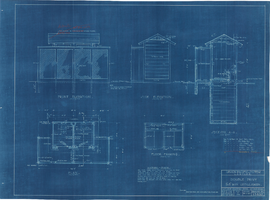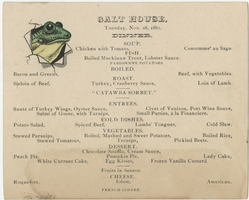Search the Special Collections and Archives Portal
Search Results

Los Angeles & Salt Lake Railroad Company double privy: architectural drawing
Date
Archival Collection
Description
From Union Pacific Railroad Collection (MS-00397). The scales are noted in the drawing. The bottom of the drawing says, "Material-Finish: All Finish Lumber Unless Otherwise Noted Shall Be [Opsas?] Wood Work Of Vault Shall Be O.P Rough. Exterior Of Privy Including Both Sides Of Door And Door Jamb: Also Wood Lattice Screen On All Sides Shall Be Painted With 3 Coats C.S. Lead & Oil Paint As Directed. Doors Shall Be Hung On 3 1/2" x 3 1/2" Botts. Doors Shall Be Provided With Rim Latch Knob Lock And Iron Barrel Bolt. Revisions: Added Vent Stacks, Seat Cover, Double Floor & Floor Shoe".
The bottom corner of the drawing states, "Union Pacific System L.A. & S.L.R.R. Double Privy 5'x8' With Lattice Screen. Ass't Chief Engineer's Office. Los Angeles, Calif. Drawn By E.C.B. Traced By E.C.B. Checked By F.W.G. Date June 14, 1926. Scale As Noted. Revised May 5. 1927. Drawing No. 15637".
Also written on the drawing: "Two to be built at East Yard, Calif. One ' ' Big Springs, Nev. ' ' Las Vegas, Nev. ' ' Borden, Utah. ' ' Elgin, Nev. 1927. ' ' Dry Lake, Nev. 1927. ' ' Wann ' ' 1928 [crossed out]."
Image

Grand Hôtel du Louvre, menu, December 16, 1875
Date
Archival Collection
Description
Text

Galt House, menu, Tuesday, November 28, 1882
Date
Archival Collection
Description
Text
Ann Valder Papers
Identifier
Abstract
Ann Valder Papers (1963-1984) include agendas and minutes, programs, invitations, events, and newspaper clippings. The papers are limited to the time Valder spent working for the Review Journal and the Valley Times in Las Vegas, Nevada. The activities covered are her work with Southern Nevada Memorial Hospital and the American Cancer Society.
Archival Collection
Nevada Hotel and Motel Association Collection
Identifier
Abstract
The Nevada Hotel and Motel Association Collection contains items from the hospitality and service industries from 1979 to 1992. The collection consists of trade publications, conference brochures, and industry reports focusing on the service and hospitality industries in Nevada.
Archival Collection
Ashley “Ms. Aye Vee” Vargas oral history interview
Identifier
Abstract
Oral history interview with Ashley “Ms. Aye Vee” Vargas conducted by Laurents Bañuelos-Benitez on October 30, 2018 for the Latinx Voices of Southern Nevada Oral History Project. In this interview, Vargas discusses her experiences growing up on the east side of Las Vegas, Nevada. She describes experiences with racial boundaries, the issue of colorism in the Latinx community, and dealing with Puerto Rican stereotypes. Vargas then talks about her involvement with Student Organization of Latinos (SOL), the Puerto Rican community in Las Vegas, and elaborates on how Puerto Rican culture has been influenced by American culture. Lastly, Vargas discusses the meaning behind her poems, raising awareness about certain issues in the Latinx community, and how Las Vegas is going through an artistic renaissance.
Archival Collection
Francisco Rufino-Parra oral history interview
Identifier
Abstract
Oral history interview with Francisco Rufino-Parra conducted by Barbara Tabach on December 06, 2018 for the Latinx Voices of Southern Nevada Oral History Project. In this interview, Parra discusses his family background and immigrating to the United States from Mexico in 1989. He recalls moving to Las Vegas, Nevada in 1994 and describes his first impressions of the city. Parra then talks about his employment at the Paris Las Vegas Hotel and Casino as a dishwasher, being promoted, and becoming a member of Culinary Workers Union Local 226. He explains his role as shop steward for the Culinary Workers Union and describes the union strikes in 2018. Later, Parra discusses raising his three children in Las Vegas, living in a bilingual household, and how he has learned many languages from working in the hospitality industry. Lastly, Parra recalls visiting his birthplace and becoming a United States citizen.
Archival Collection
Janet Savalli oral history interview
Identifier
Abstract
Oral history interview with Janet Savalli conducted by Irene Rostine on September 21, 1996 for the Women's Research Institute of Nevada (WRIN) Las Vegas Women Oral History Project. Savalli begins her interview by discussing her move to Las Vegas, Nevada as a child in 1945. Savalli then goes on to discuss her 46 year long career at the Southern Nevada Telephone Company. She describes rising through the company starting as an operator and ending as a community relations coordinator. Savalli discusses the company's merger with Sprint and the changes this brought about including the creation of a union and wage and benefits changes. Savalli ends her interview by talking about atomic testing, and how the testing grew to be a part of Las Vegas culture at the time.
Archival Collection
Jonathan S. Sparer, FAIA oral history interview
Identifier
Abstract
Oral history interview with Jonathan S. "Jon" Sparer, FAIA conducted by Barbara Tabach on March 04, 2015 for the Southern Nevada Jewish Heritage Project. Sparer discusses his career as an architect of many major Las Vegas, Nevada hotels and casinos. He also talks about designing the Congregation Ner Tamid and The Center for the Lesbian, Gay, Bisexual, and Transgendered (LGBT) community.
Archival Collection
Albert S. Henderson Photograph Collection
Identifier
Abstract
The Albert S. Henderson Photograph Collection (1860s-1959) primarily contains black-and-white photographic prints of Albert S. Henderson and his family. Also included in the collection are photographic prints of Henderson during his tenure as a Nevada legislator and district judge. Other materials include postcards, negatives, and a tintype.
Archival Collection
